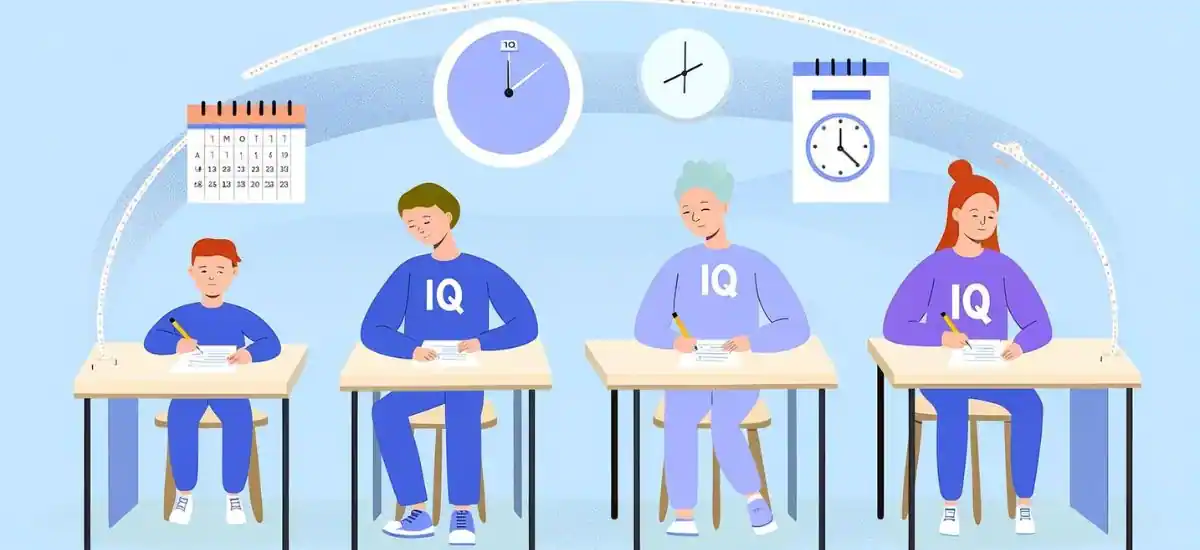Understanding the average IQ for a 12-year-old can provide insight into the developmental stages of children’s intellectual abilities. An IQ, or Intelligence Quotient, is a score derived from standardized tests designed to measure human intelligence. The average score for the general population, regardless of age, is fixed at 100 points. This score represents the norm or the standard level of intelligence compared to the population at large.
Average And Highest IQ For A 12-Year-Old
For a 12-year-old, the IQ range is the same as for other ages, Average IQ scores for 12-year-olds range from 97 to 117 points, with 100 being the average score. The highest achievable score on most IQ tests is around 145, and the lowest is around 61. A score within this range signifies that the individual is within one standard deviation of the mean IQ score for their age group. For example, a score of 115 indicates above-average intelligence, while a score of 85 might indicate below-average intelligence for a 12-year-old.
IQ Tests And Age-Specific Norms

IQ tests assess a range of cognitive abilities, including problem-solving, memory, and language comprehension. They are standardized and normed on diverse samples, ensuring reliable comparisons of an individual’s intellectual capabilities to the general population. The methodology emphasizes consistency and validity in measurement.
The Significance Of Age-Specific Norms In IQ Testing
Age-specific norms are crucial for fair IQ assessment across different ages, reflecting the natural variation in cognitive development. These norms allow IQ scores to be compared meaningfully within the same age group, with an average IQ score set at 100 and a standard deviation of 15.
Overview Of The Most Common IQ Tests Used For Children
- Wechsler Intelligence Scale for Children (WISC): Widely used for ages 6-16, assessing verbal, reasoning, memory, and processing speed. Provides a Full Scale IQ score and domain-specific scores.
- Stanford-Binet Intelligence Scales: Suitable for a broad age range, it evaluates fluid reasoning, knowledge, quantitative reasoning, visual-spatial processing, and working memory. Known for its flexibility in assessing various intellectual capabilities.
- Kaufman Assessment Battery for Children (KABC): Focuses on being culturally fair, minimizing language and cultural biases. It’s used for ages 3-18, emphasizing problem-solving, memory, and learning capabilities.
Each test is administered by trained professionals and chosen based on the child’s specific needs and the assessment’s purpose.
Average IQ Score By Age

The design of modern IQ tests ensures that the average IQ score across various ages is set at 100. However, the average scores can vary slightly depending on the age group:
- 12-13-year-olds: Typically, the average IQ score for this age group adjusts slightly above 100, reflecting the cognitive growth associated with early adolescence.
- Teenagers: As children enter their teenage years, there might be a slight fluctuation in the average IQ scores, influenced by both biological and environmental factors.
For a deeper understanding of cognitive milestones at a slightly younger stage, explore our detailed analysis on “What Is The Average IQ For A 10-Year-Old?” to see how their intellectual capabilities are assessed.
Normal IQ Range For A 12-Year-Old
The normal IQ range for a 12-year-old aligns with the broader definition of a normal IQ range, which is from 90 to 110. An IQ score of 120 or more is often considered superior, and scores below 70 are typically associated with intellectual disabilities.
To complement our understanding of cognitive development, you might also be curious about physical growth metrics at this age. For insights on “How Tall Should A 12-Year-Old Be” check our related section that covers this topic in detail.
Factors Influencing IQ Scores In Children
The Role Of Genetics In Determining IQ
Genetics account for 50-80% of IQ variance, emphasizing the hereditary aspect of intelligence. However, this is not the sole factor; environmental influences also play a crucial role.
Environmental Factors That Can Affect IQ Scores
Environmental conditions such as nutrition, exposure to toxins, and learning opportunities significantly impact cognitive development. Early interventions and educational programs can positively influence IQ, highlighting the environment’s malleability on intelligence.
The Impact Of Education And Socio-Economic Status
Socio-economic status (SES) and the quality of education are key determinants of a child’s IQ. Higher SES often means access to better resources and enriched environments, fostering cognitive growth. Conversely, lower SES is linked to restricted educational access and developmental challenges, underscoring the need for equitable educational opportunities.
Enhancing IQ Levels For 12-Year-Olds

Enhancing a child’s IQ involves engaging activities that stimulate cognitive development and learning:
- Engage in Strategic Games: Games that require strategic thinking and problem-solving, such as chess or puzzles, can enhance cognitive abilities.
- Physical Exercise: Encouraging regular physical activity can boost brain function and, consequently, IQ scores.
- Nutrition: A balanced diet, potentially supplemented with brain-boosting nutrients like Omega-3 fatty acids, can support cognitive health.
- Adequate Sleep: Ensuring that a 12-year-old gets sufficient sleep is crucial for cognitive development and functioning.
- Learning New Skills: Encouraging learning new languages or musical instruments can stimulate brain growth and improve IQ scores.
Frequently Asked Questions
Q1: Can a child’s IQ change over time?
A1: Yes, a child’s IQ can change over time. Factors such as education, environmental changes, and personal experiences can lead to fluctuations in IQ scores.
Q2: Are IQ tests accurate for all children?
A2: While IQ tests aim for accuracy, their effectiveness can vary due to cultural biases, language barriers, and differences in test administration, making them less accurate for some children.
Q3: How often should a child take an IQ test?
A3: There’s no set frequency, but retesting might be considered if there’s been a significant change in the child’s environment, educational setting, or if specific educational planning is needed.
Q4: Can emotional intelligence affect IQ test results?
A4: Emotional intelligence itself doesn’t directly affect IQ test scores, but it can influence a child’s test-taking abilities, such as persistence and stress management, potentially impacting their performance.
